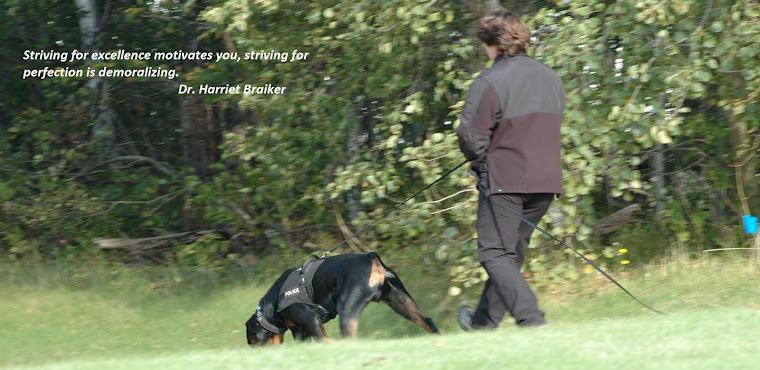Today involved a long day of driving and I had a chance to let my mind wander on dog training, more specifically my own dogs or the the dogs/handlers that I work with and how best to help them become better at their particular skills.I have been very fortunate to have had the opportunity to provide people and dogs with varying levels of coaching in a wide variety of sports and working venues. From detection training to tracking to problem solving for competitive agility and obedience etc. While I don't profess to be an expert in everything (jack of all trades....??) I see some common things regardless of the training activity or venue. Or at least I find myself giving the same lecture regardless of what I am teaching. Even worse I have to give myself the same lecture!
Years ago when I was teaching my first SAR dog to do human remains detection from a boat our training looked a bit like this:
Bevan would get into odor -> Bevan would show some very small scent detection behavior -> I would say something like "watcha got boy?" -> he would get more animated -> I would say something else encouraging and get him excited -> he would show strong behavior -> I would respond with more enthusiasm -> he would alert....
Kind of like a game of badminton... It was what I was told to do and as a novice handler my dog appeared to be doing well. However it didn't work quite as well when it came to working a blind problem (where I didn't know where the scent was). Although painful to watch I was lucky to have someone to video tape our training session since I clearly was doing crossword puzzles in my head at the time. That scenario looked a bit like this:
Bevan would get into odor -> Bevan would show some small scent detection behavior -> blank look from handler....
It doesn't take a rocket scientist to see the flaw here.....Even better, the video perfectly captured the poor dog frantically looking at me, clearly wanting me to perform step three so he could move onto step four! Later on, when I knew what to look for, I actually used that frantic glancing back as scent detection information and learned to maneuver the boat so he could work the scent and alert at source and he developed a nice independent alert and went on to be a reliable and proficient water search dog. I was also very fortunate to be working a dog who was VERY forgiving of my mistakes and managed to figure out what I wanted in spite of me sometimes.
The above is an extreme example with a green dog and green handler but I see similar examples both with new and experienced handlers over a wide variety of activities. Over the weekend I helped a woman and her dog work on sport tracking. We were discussing training the dog to indicate on the articles on the track. Quite often in training I see the handler and dog track up to the article - the dog hesitates at the article - the handler cues the down - the dog downs - the dog gets rewarded. The problem with a great many dogs (not all) is that this is how they would describe the exercise: "I track up to the article, sniff it, mom tells me down and then I get rewarded". Without the cue the behavior doesn't happen and the dog moves on. So we go back to doing more reps of the above exercise hoping that will help. Unfortunately we have unwittingly firmly placed ourselves into the behavior chain of the exercise and then in competition or performance or testing we don't do our part, we don't provide that important link, and we get annoyed with the dog. Worse we let the dog down by bailing on them when the pressure is on.
The training of a certain exercise is highly specific to that particular skill - however when you are looking to improve a skill or the dog is not performing it like you think they should, look to your own behavior. Are you providing information that is creating that behavior or allowing it to occur. I know from my own experiences that there is a good chance that you are training exactly what you are getting!
"K9 Bevan"


No comments:
Post a Comment